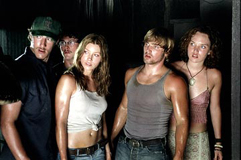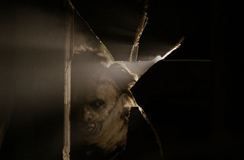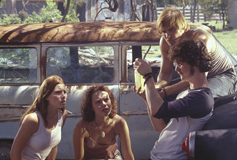The Texas Chainsaw Massacre (Marcus Nispel, 2003)
 First-time director Marcus Nispelís
aggressive remake of Tobe Hooperís classic horror flick The
Texas Chainsaw Massacre might be dumbed down when compared to its
predecessor, but it gains an immeasurable amount of visceral impact as a result.
Though itís been several years since Iíve seen the film often referred to as
ďthe scariest movie of all time,Ē the feeling I remember most strongly from
it is not a sense of overpowering fright, but instead the way that its director
turned a real-life tale of unspeakable horror (like Norman Bates and Hannibal
Lector, its ghastliest details were rooted in the actual case of Ed Gein) into a
sometimes strained metaphor about one familyís ideals of consumerism gone
horribly wrong. Also noteworthy about Hooperís film was its willingness to
confront audiences with a brand of undiluted violence that had been up to that
point only presented to the mainstream in the news coverage of the Vietnam War.
Though itís still set in 1973, and though it takes great pains to convince us
itís based on a true story, the remake essentially disposes with any such
subtext or context. It simply exists, like a haunted house ride at an amusement
park, to inspire dread in the audience and to shock us with cheap thrills. While
that might disappoint those who go to slasher films looking for grander
edification, for me, the approach worked amazingly well.
First-time director Marcus Nispelís
aggressive remake of Tobe Hooperís classic horror flick The
Texas Chainsaw Massacre might be dumbed down when compared to its
predecessor, but it gains an immeasurable amount of visceral impact as a result.
Though itís been several years since Iíve seen the film often referred to as
ďthe scariest movie of all time,Ē the feeling I remember most strongly from
it is not a sense of overpowering fright, but instead the way that its director
turned a real-life tale of unspeakable horror (like Norman Bates and Hannibal
Lector, its ghastliest details were rooted in the actual case of Ed Gein) into a
sometimes strained metaphor about one familyís ideals of consumerism gone
horribly wrong. Also noteworthy about Hooperís film was its willingness to
confront audiences with a brand of undiluted violence that had been up to that
point only presented to the mainstream in the news coverage of the Vietnam War.
Though itís still set in 1973, and though it takes great pains to convince us
itís based on a true story, the remake essentially disposes with any such
subtext or context. It simply exists, like a haunted house ride at an amusement
park, to inspire dread in the audience and to shock us with cheap thrills. While
that might disappoint those who go to slasher films looking for grander
edification, for me, the approach worked amazingly well.
 Thankfully, along with the sense of
post-Vietnam trauma (which would not really make sense in a modern film), the
movie jettisons a lot of the gallows humor that dominated the original. Most
notably, the over the top dinner-table scene has been excised and the movie
achieves a stronger narrative drive as a result. The director imbues even his
establishing shots with a sense of dread that permeates throughout. It wasnít
long after the start of the film before I felt Nispel had thrust me into a
primal state where I really wasnít ready to interpret subtext or worry about
metaphors. I was just scared. The visceral excitement of any given moment drove
me on. It held me in its grasp, as any great suspense film should. Even as I
questioned whether or not I should stay, I knew I had to see what would happen
next.
Thankfully, along with the sense of
post-Vietnam trauma (which would not really make sense in a modern film), the
movie jettisons a lot of the gallows humor that dominated the original. Most
notably, the over the top dinner-table scene has been excised and the movie
achieves a stronger narrative drive as a result. The director imbues even his
establishing shots with a sense of dread that permeates throughout. It wasnít
long after the start of the film before I felt Nispel had thrust me into a
primal state where I really wasnít ready to interpret subtext or worry about
metaphors. I was just scared. The visceral excitement of any given moment drove
me on. It held me in its grasp, as any great suspense film should. Even as I
questioned whether or not I should stay, I knew I had to see what would happen
next.
 Chainsaw is a remarkably sadistic exercise, and it asks us to get a thrill
out of watching fictional teens in peril, but at the same time one canít say
that it ever asks us to root for the killers over the victims. The villains, and
the murders themselves, are too horrible to ever feel ďcoolĒ. Visually, it
presents an odd mix of the polished and the grisly, resulting in a feel that is
too stylized to be mistaken for realistic. As the hideous events in the movie
accumulate, the movie becomes increasingly nightmarish and difficult to watch.
Believability is jettisoned, not so much due to implausibility, but because it
becomes harder and harder to comprehend the scope and relentlessness of the
torture on display. As accomplished as the film is (thereís an hour or so in
the middle thatís a virtuoso example of sustained mood), it does perhaps
stumble a little in its final reel, which finds its protagonist, finally, taking
on the role of the empowered female. Itís an odd and almost ironic twist to a
movie that has subjected her character to so much depravity, sexual and
otherwise, but, to be quite frank, my nerves were happy that the movie was
willing to buck toward convention at the end.
Chainsaw is a remarkably sadistic exercise, and it asks us to get a thrill
out of watching fictional teens in peril, but at the same time one canít say
that it ever asks us to root for the killers over the victims. The villains, and
the murders themselves, are too horrible to ever feel ďcoolĒ. Visually, it
presents an odd mix of the polished and the grisly, resulting in a feel that is
too stylized to be mistaken for realistic. As the hideous events in the movie
accumulate, the movie becomes increasingly nightmarish and difficult to watch.
Believability is jettisoned, not so much due to implausibility, but because it
becomes harder and harder to comprehend the scope and relentlessness of the
torture on display. As accomplished as the film is (thereís an hour or so in
the middle thatís a virtuoso example of sustained mood), it does perhaps
stumble a little in its final reel, which finds its protagonist, finally, taking
on the role of the empowered female. Itís an odd and almost ironic twist to a
movie that has subjected her character to so much depravity, sexual and
otherwise, but, to be quite frank, my nerves were happy that the movie was
willing to buck toward convention at the end.
73
10-21-03
Jeremy Heilman